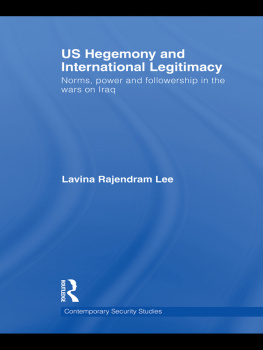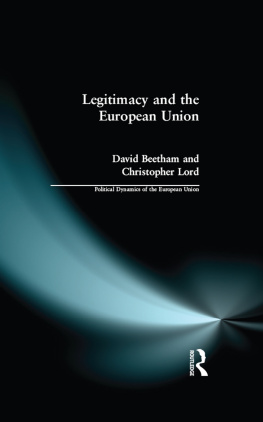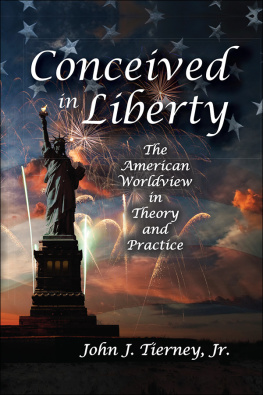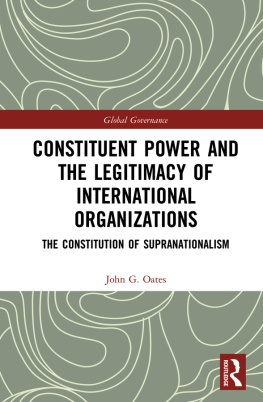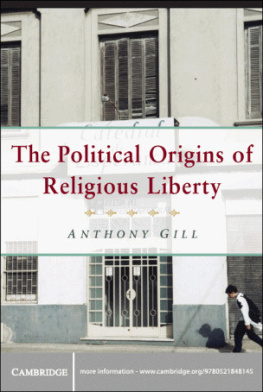WEBER
THEORY OF LIBERTY, LEGITIMACY AND POWER
THEORY OF LIBERTY, LEGITIMACY AND POWER
New Directions in the Intellectual and Scientific Legacy of Max Weber
Edited by
VATRO MURVAR
First published in 1985
Reprinted in 2006 by
Routledge
2 Park Square, Milton Park, Abingdon, Oxfordshire, OX14 4RN
270 Madison Avenue, New York NY 10016
Routledge is an imprint of Taylor & Francis Group, an informa business
First issued in paperback 2010
1985 Vatro Murvar
All rights reserved. No part of this book may be reprinted or reproduced or utilized in any form or by any electronic, mechanical, or other means, now known or hereafter invented, including photocopying and recording, or in any information storage or retrieval system, without permission in writing from the publishers.
The publishers have made every effort to contact authors and copyright holders of the works reprinted in the Weber series. This has not been possible in every case, however, and we would welcome correspondence from those individuals or organisations we have been unable to trace.
These reprints are taken from original copies of each book. In many cases the condition of these originals is not perfect. The publisher has gone to great lengths to ensure the quality of these reprints, but wishes to point out that certain characteristics of the original copies will, of necessity, be apparent in reprints thereof.
British Library Cataloguing in Publication Data
A CIP catalogue record for this book is available from the British Library
Theory of Liberty, Legitimacy and Power
ISBN 13: 978-415-40210-1 (set)
ISBN 13: 978-0-415-40218-7 (volume) (hbk)
ISBN 13: 978-0-415-61111-4 (pbk)
Routledge Library Editions: Weber
Theory of liberty, legitimacy and power:
new directions in the intellectual and scientific legacy of Max Weber
Edited by
Vatro Murvar
First published in 1985
by Routledge
2 Park Square, Milton Park, Abingdon, Oxon, OX14 4RN
270 Madison Ave, New York NY 10016
Set in Times, 10 on 11pt
by Input Typesetting Ltd, London
CopyrightVatro Murvar 1985
No part of this book may be reproduced in any form without permission from the publisher, except for the quotation of brief passages in criticism
Library of Congress Cataloging in Publication Data
Theory of liberty, legitimacy, and power.
(International library of sociology)
Bibliography: p.
Includes index.
1. Weber, Max, 18641920Political scienceAddresses, essays, lectures. 2 Weber, Max, 18641920SociologyAddresses, essays, lectures. 3. LibertyAddresses, essays, lectures. 4. Legitimacy of governmentsAddresses, essays, lectures. 5. Power (Social sciences)Addresses, essays, lectures. 6. Political sociologyAddresses, essays, lectures. I. Murvar, Vatro, 1920II. Series
JC263.W42T47 1985 306.2 8422333
British Library CIP data also available
ISBN 0710203551
To Bernadine
Max Webers opus is a source of an apparently unending intellectual excitement, argumentations, and conflicting interpretations from Japan to continental Europe, England, the United States, Canada, and slowly but surely to the developing world.
In the Weber Colloquia and Symposia at the University of Wisconsin-Milwaukee, and at the international/national and regional annual meetings of professional associations over a period of several years, over 140 lectures on various aspects of his legacy have amply witnessed these unusual phenomena. Will his legacy ever be liberated from all the misconceptions and misinterpretations commencing in his own time and rapidly accumulating after by his posterity?
In the promotion materials for this book we initiated the claim that this book has no competitors. Even the title may surprise some. The theory of liberty, inseparable from the other two, has not been associated with Webers name as the theory of power has been, and to a somewhat lesser degree the theory of legitimacy. Isolated from each other, the various theoretical assumptions classified him quite inappropriately as legal positivist, legalist and a host of other labels.
The editor expresses his special gratitude to Peter Hopkins for his professional understanding of a particular situation, for his steady encouragement over a long period of time and for suggesting we cut the Gordian knot by sending him the manuscript iilstead of waiting for some slowly developing finalizations.
While individual authors have indicated their appreciation to those who helped them, the editor acknowledges here his indebtedness to colleagues whose skills and patience have improved the quality of those segments they read: Thomas Burger, Cornelius Cotter, Charles Glock, Scott Greer, Harry Johnson, Guy Oakes and others. Thank you is due to the participants in the Max Weber Colloquia and Symposia from their inception in 1976; their questions and discussions have guided the authors toward a better final formulation. Their contributions at the Colloquia dealt with aspects of Webers work outside the theme of this book and have been published elsewhere. None of them could be held responsible for ideas finalized here.
Vatro Murvar
The stature of Max Weber (18641920) as an interdisciplinary historical-comparative scientist has steadily grown in the last two or three decades. This is in part due to the impact of the recently translated segments of his unfinished opus, which are quite set apart from the traditional notions on Weber. His intellectual and scientific legacy is continuously being compared with the thought of Machiavelli, Hobbes, Rousseau, Tocqueville, Marx, Nietzsche, Burckhardt, Jellinek, Keynes, and others. Nowadays the automatic identification of his name with the image of a one-book author or The Weber Thesis (which sadly enough reflected one of his least significant, highly tentative works) is almost gone from the academic and publishing world.
Some decades ago Giovanni Papini said that the fiercest penalty a creative, innovative and productive man must pay is the existence of so-called disciples who attempt to appropriate his doctrine for their own individual, petty, and quasi-intellectual activities. In Webers case it was not really disciples, which he did not wish to have, but posterity some decades after his death. Paradoxically, the controversies of Webers lifetime, when he was always in favor of liberty against the political-industrial establishments of Germany, Austria, and Russia and their respective imperialisms that he hated so intensely, have been almost forgotten today. In contrast, Weber is now being made controversial post mortem by the living posterity now grown internationally. These alleged post-mortem Weber controversies are actually rooted in many fresh misconceptions and misinterpretations of his still incompletely translated opus.
Moreover, ritual genuflection before the legitimacy-bestowing authority replaces a genuine willingness to take the author seriously: there are plenty of books and articles in which references to Weber amount to no more than lip service. While being often mentioned and seldom read is one of the tragic consequences of greatness, another is being the target for a flood of interpretations and reinterpretations. Though the line between legitimate and illegitimate variants is not always easy to draw, it can be fairly said that Weber has been misinterpreted with remarkable thoroughness and frequency. Some of the misinterpretations have enjoyed considerable longevity, so much so as to become orthodoxy. Misinterpretations of his original work can be found in all areas: from epistemology and sociology of knowledge and art, through political and economic sociology, to sociology of law, revolution, religion, and ideology. (For a list of some misconceptions within just one major area which persist despite strong objections by the specialists, see this authors 1983:37.)






